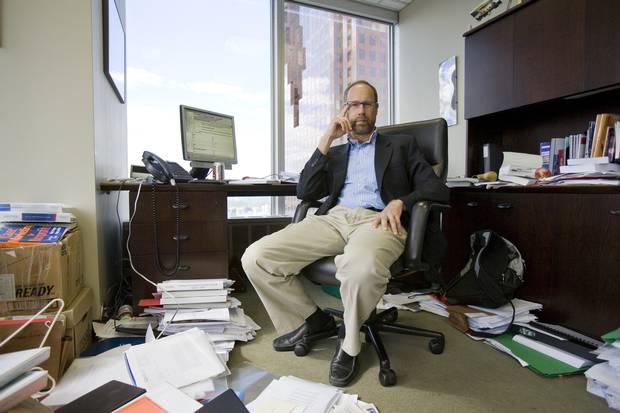During my first year at The Globe and Mail, a senior colleague suggested I sit in on a class she taught with a top corporate lawyer. Her fellow instructor, Ed Waitzer, had managed Stikeman Elliott, one of Bay Street's most prestigious corporate law firms, and she swore the law school students and I would learn a lot.
She wasn't lying. Canadian corporate and securities law can be mind numbing; there's a dearth of salacious insider-trading scandals and the trials for high-profile cases often take years to start. But Mr. Waitzer had a way of approaching it from fascinating prisms, making you care more than you thought you ever could. "I want to have sex with his brain," one former student once told me.
Five years later, that brilliant mind, and the man attached to it, is sitting in front of me at Mercatto in downtown Toronto on one of those glorious late-spring Fridays. Mr. Waitzer's attire matches the mood: Blue jeans, navy loafers, dark blazer – and dress shirt unbuttoned at the top, letting his copious chest hair flow.
We've talked many times over the years, yet the lawyer-turned-academic has remained somewhat of an enigma. He climbed to the highest echelons of corporate law, despite progressive political views that had his early colleagues calling him a "Commie". He served as the chief watchdog at the Ontario Securities Commission, Canada's leading securities regulator, but also gave legal advice to Conrad Black.
He is also one of the few successful Bay Street types to break norms. For most advisers, legal or financial, the firm always comes first. Mr. Waitzer, meanwhile, took a year-long sabbatical in Chile while still technically running the law firm, moving his young kids with him to boot.
His approach to law is rather unconventional. "You make it up," he says.
"I spent my legal career playing on the edge of laws to see how you can change systems," he explains. In 2008, he served as a top legal adviser to BCE Inc. during its proposed $35-billion leveraged buyout. What started as a traditional takeover grew to be so contentious that the Supreme Court eventually had to step in. At the heart of that case: whether the buyer, a group led by the Ontario Teachers' Pension Plan, was slapping on so much debt that it made existing BCE bondholders suffer.
The Supreme Court ruled in BCE's favour and its lengthy decision laid out ground rules for the way to conduct future transactions. The ruling "helped shift more responsibility to directors, and made it clear that acting in the best interests of the corporation allows directors to consider the interests of a broader range of stakeholders," Mr. Waitzer argues – not just short-term-oriented shareholders.
Mr. Waitzer, left, with Conrad Black, leaving an OSC hearing in 2014.
Aaron Vincent Elkaim for The Globe and Mail
He has also, in some ways, made up his own career path. Most advisers are confined to a single sector, such as mining, or to a certain type of expertise, such as mergers and acquisitions; Mr. Waitzer has been peripatetic. His latest project is pension reform from the private sector. His mission, if you can call it that, is to persuade Canada's largest financial institutions to offer low-cost pension products that meet the needs of 85 per cent of the population – akin to exchange-traded funds for retirement savings.
"There are just so many interesting things to do in life. So many kids think there's a straight path and they lose all that peripheral vision," he says of his restlessness. Let loose. Go for it. "It's a very liberating way to think about your life."
Over purple kale salad with a truffle vinaigrette, followed by seafood linguine, Mr. Waitzer, who was raised in Toronto, explains he was always drawn to counterculture. In high school, he helped start an alternative school in the basement of a Jewish community centre, got it accredited, then failed Grades 12 and 13 because he was so busy running it, among other things. The only reason he got into the University of Toronto was because the registrar served on the committee that approved the experiment. (The school, which is called SEED, still exists.)
He lasted only two years at U of T. Inspired by Pierre Trudeau's call for citizen participation to help build Canada, he spent minimal time in class. One of his ideas: to take some of the newly created Canadian cable licences that were dedicated as community channels and use them for community organizing, borrowing from Brazilian educator Paulo Freire's then-progressive idea to use video to teach adult literacy – something that produced astonishing results.
"I never intended to practise law," he explains, saying he weighed it against becoming a rabbi. Law won, partly "because it was a three-year degree." But he had a big problem: writing the LSATs, the universal admissions test. He hadn't studied math since Grade 11. "All I had going into the math part was, 'Your first guess is your best guess,'" he explains.
Going on hunches, he finished the exam in no time. When he got the results, he scored among the highest percentiles for the English portion, but horribly in math. Yet the invigilator had marked down that he was sick when he walked out, "so they let me into law school."
After graduating at 22 and articling with Ian Scott, who ran a boutique litigation firm and was doing work for the Mackenzie Valley pipeline, he moved to a job with the Toronto Stock Exchange in 1978, where he dug into policy. (Mr. Waitzer had roots in this world: His father worked in the brokerage business and at one point was a governor of the TSE.) From there he went to Stikeman Elliott, which involved spending three years in New York, and later jumped to the OSC in the mid-90s.

Mr. Waitzer at his Stikeman Elliott office in 2007.
Philip Cheung for The Globe and Mail
Then, he thought about giving it all up. "When I left the securities commission, I had severed all ties with Stikeman," he says. "I didn't think I'd go back to the law firm." One of his ideas was to bring Vanguard, the massive American exchange-traded-fund provider, to Canada. Vanguard was known for its low costs, and Mr. Waitzer had just spent years at the OSC dealing with fat mutual fund fees, which could be 5 per cent annually and sometimes more. "But it became clear after a while that their time frame wasn't my time frame." (Vanguard eventually launched in Canada in 2011.)
Feeling a little lost, he borrowed an office from a friend and spent his days talking to people – even a psychologist. Some of the feedback was startling. "Whatever you do, don't go back to the law firm," said John Tory Sr., co-founder of Torys LLP and later the Thomson family's consigliere. (The Thomsons own The Globe and Mail.)
This was all very strange advice, considering Mr. Tory had started one of the country's top firms with his brother. "Ed, when you get to be my age, you're going to spend as much time looking backwards as you do looking ahead," Mr. Waitzer recalls being told. "The more different things you've done in life, the fuller and richer life will seem to you."
Mr. Waitzer explored a few entrepreneurial ideas, but he kept getting calls from law firms and investment banks. "As I got those approaches, I sort of asked myself why would I go somewhere where I don't know the people and the culture," he says. So he went back to Stikeman Elliott, but laid down some new rules – one of which was that he would have no managerial responsibility. That didn't last long. In 1999, he was named chair for the entire firm, a position he held until 2006.
Now 62, he appreciates his profession in ways he never imagined. "If I was starting all over again, law would be even more attractive … because political markets have become so thin," he says. Politicians rarely show the grit necessary to shake up systems, while courts have been become much more active. "The way you end up changing things is in private law."
Technically, he's become a full-time academic with a few side gigs, such as his chairmanship of the LCBO, Ontario's liquor distribution monopoly, but he still practices law and keeps an office at Stikeman Elliott. When he vaulted into academia, he thought he'd be absorbed in deep conversations about business and law. The reality was much different. "You walk up and down the hall at the law school or the business school and no one's there," he says. At the firm, "I can test my thinking against people who are way smarter than me."
As we wind down, I ask about the future of Big Law. He doesn't hold back. "Eighty per cent of what you do in a law firm … is stuff that can be commoditized in one way or another, so the cost structure is going to change," he argues. "But the actual practice of law at the high end, where you're doing stuff that actually makes a difference, is going to be a lot more accessible and a lot more exciting."
He knows that sounds rather rose-coloured, so he acknowledges disruption is never easy. Law school students are paying tens of thousands in tuition to get high-paying jobs that may not be there in a few years. But he strongly believes everyone needs to let go a little – particularly senior lawyers who have been practising for years.
"I saw it at the law firm," Mr. Waitzer says, recalling his days running Stikeman Elliott. So many partners were making more money than they could almost anywhere else, and they'd ratcheted up their lifestyles. Feeling trapped, "they just couldn't imagine doing anything else."
"I can't think of a single person who stepped out – and I know lots of them – to do a sabbatical, to go off to do public service for a time, whatever, who didn't find it rewarding and for whom it was a significant impediment to continuing to be able to do things they wanted to do," Mr. Waitzer declares.
"You make money. You lose money. You have divorces," he says matter-of-factly. Explore. "Life happens and you have very little control over the timing, so you go for things when they present themselves."
